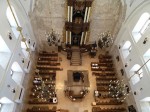(photo from Deror avi via commons.wikimedia.org)
It’s the children, at first, that inspire awe, the infants now walking, the toddlers talking, the grade schoolers freshly combed and pressed, the high schoolers immense, the college students all but unrecognizable in their newfound sophistication. The brief span of 12 months has metamorphosed them all. They enter the sanctuary this Rosh Hashanah morning with an eye to audience and reunion, conscious, as at few other times, of their own growth and maturity, the oldest children flanking their parents with an air of independence, the slick-haired sons towering over balding fathers, the bejeweled daughters as carefully coifed and clothed as their mothers, all proud of what they have become.
Change is everywhere: new siblings sit wedged between the old, once-single adults arrive partnered, young wives enter expectant, older couples return fractured, cleaved in twain by death or divorce. Gravity exerts its inexorable pull upon the bowed backs of the oldest congregants; the cast of many a head has grown silver; chins have sprouted beards, foreheads become more deeply furrowed, eyes less acute.
I sit among my own altered children marveling at this tidal wave of transformation passing through our midst, hoisting some as it submerges others, bearing all of us, inexorably, toward eternity. From day to day, the alchemy of aging goes unremarked, even as our children molt before our eyes. We are not meant to be conscious of every instant of change, preferring not to be reminded of the mortality and uncertainty it implies. We seek instead a reassuring constancy, a routine that grounds and sustains us, though we know our time here is all too finite, that even as we feel most anchored, we are slowly, imperceptibly, drifting out to sea. The image in today’s mirror looks no different than the one that greeted us yesterday. But a snapshot of that face a year hence tells a very different tale.
And those snapshots are what we carry with us as we enter the synagogue these High Holy Days and stare in amazement at the undeniable alteration a single year has wrought upon the familiar landscape of family and friends. It is both exhilarating and alarming, and it, more than the prayers we have come together to recite, prepares us for these Days of Awe, this personal accounting of conduct and intention, impulse and resolve.
The prospect is daunting as we join our kinsfolk and face squarely into the probing light of conscience. There is no interlocutor but the self, and perhaps no other judge. We arraign ourselves before a court of inquiry, concede doubt and weakness, ask for certainty and strength, then render judgment, emerging chastened, cleansed, perhaps annealed. We give thanks for blessings and acknowledge the fragility of our contentments, knowing that tomorrow may challenge our every conviction, undermine our serenity, rob us of everything we hold dear.
And, as we sit side by side, husbands and wives, brothers and sisters, parents and children, we discover portals to conciliation where perhaps only provocation and resistance prevailed. We rediscover tenderness and vulnerability and the myriad contradictions of our humanness. Against a backdrop of responsive prayer, we reflect upon the great challenges of parenting, on marriage’s call to remain emotionally committed, on the biblical injunction to honor our aging and increasingly infirm parents. We recite the liturgy of awe – admissions of frailty and failure, entreaties for greater understanding, for strength, for forgiveness. The gnawing hunger of Yom Kippur afternoon begins in the murmuring mouth of Rosh Hashanah, as we empty the casks of self-justification, discarding great stores of blind self-interest, and live for a time consuming nothing but the thought of our own imperfection.
And yet … while these Days of Awe clarify and distil us, they cannot sustain us. We are not cloistered contemplatives; we require a richer diet, one free of the astringent bite of continuous self-scrutiny. We need to live, to test our resolve. The gates will close, the great accounting will conclude for another year, and we will turn back to life renewed by these days of honest soul-searching, passing from assessment to action.
As the final song is sung, I turn to my family, wondering what has passed through their hearts during these hours of prayer. My son seems wrung out by so much stasis, eager to shed his confining clothes, grab a basketball and burst back into the light. My daughters yearn for the disembodied voices of friends, silver cellphones shimmering in their restless hands. My wife looks upon them with gratitude, awakening anew to the miracle of their presence in our lives, their youth, their beauty, their remarkable growth. She kisses each cheek, then takes my face in her hands and murmurs, “L’shana tova.”
May it be so for us all.
Steven Schnur, a member of Westchester Reform Temple in Scarsdale, N.Y., teaches writing at Sarah Lawrence College. This article was originally published in Reform Judaism magazine, and can be found at reformjudaism.org/these-days-awe. It is reprinted with permission.

